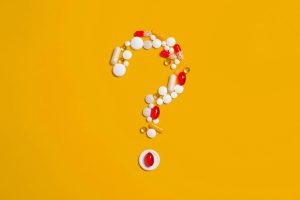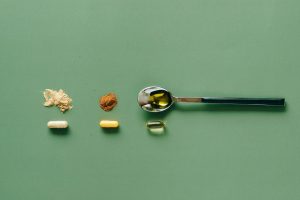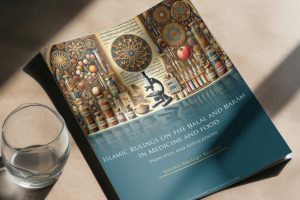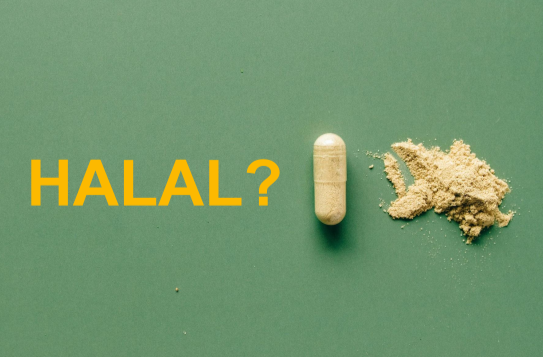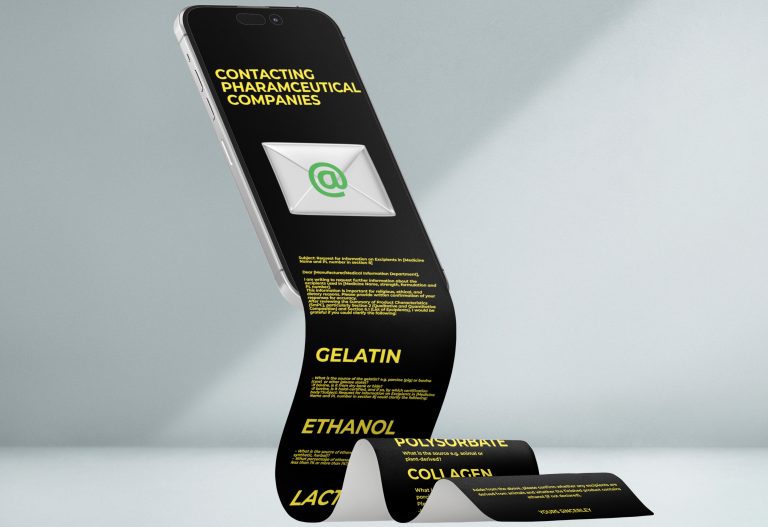Collagen in medicines
This resource can help you understand how collagen is used in medicines, the concerns around its use in medicines for the Muslim community, and whether its use in medicines is halāl (permissible) or harām (prohibited) in Islam.
This resource is for the Muslim community (including patients, carers, parents and members of the public). All healthcare professionals (HCPs), their teams and anyone involved in delivering care and support (across all care settings) to Muslim individuals, may also find it useful. It can be used to support person-centred and informed decision-making around taking medicines that align with an individual’s Islamic values and beliefs.
Collagen
Collagen is a key protein found in animals and is a vital component of connective tissues which helps to strengthen structures such as bones, muscles and skin. 1
Collagen can be sourced from the skin, bones and cartilage from animals such as cows, pigs and chickens. It can also be sourced from the scales and skin of fish. 2

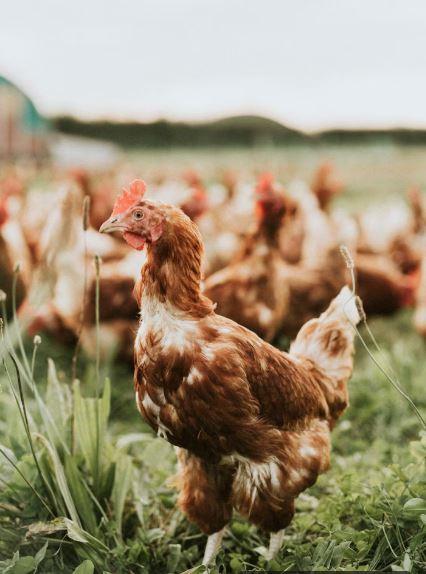
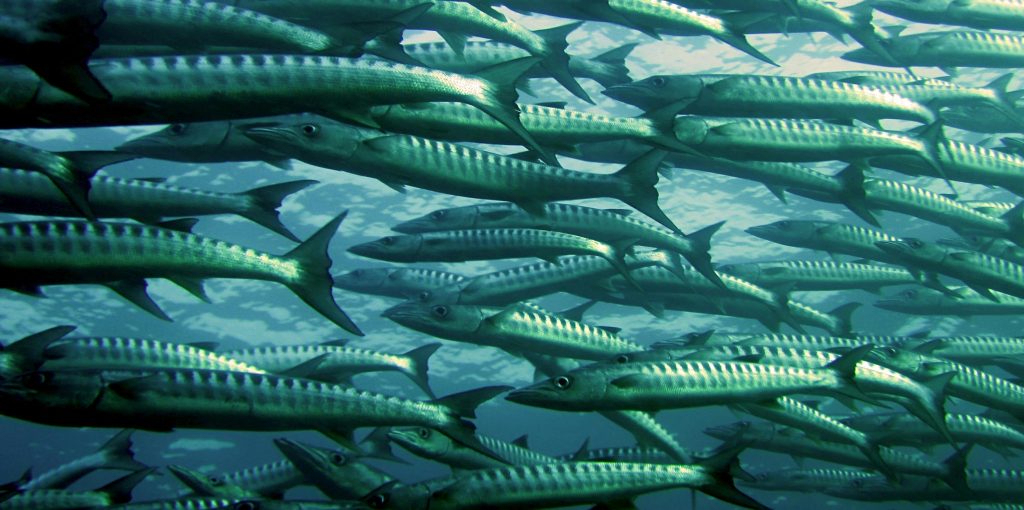
How collagen is used in medicines
Collagen can be used in drug delivery systems such as tablets for protein delivery and gel formulations for sustained drug delivery. Collagen is also marketed in the form of dietary supplements for joints, hair, skin and nails. 3
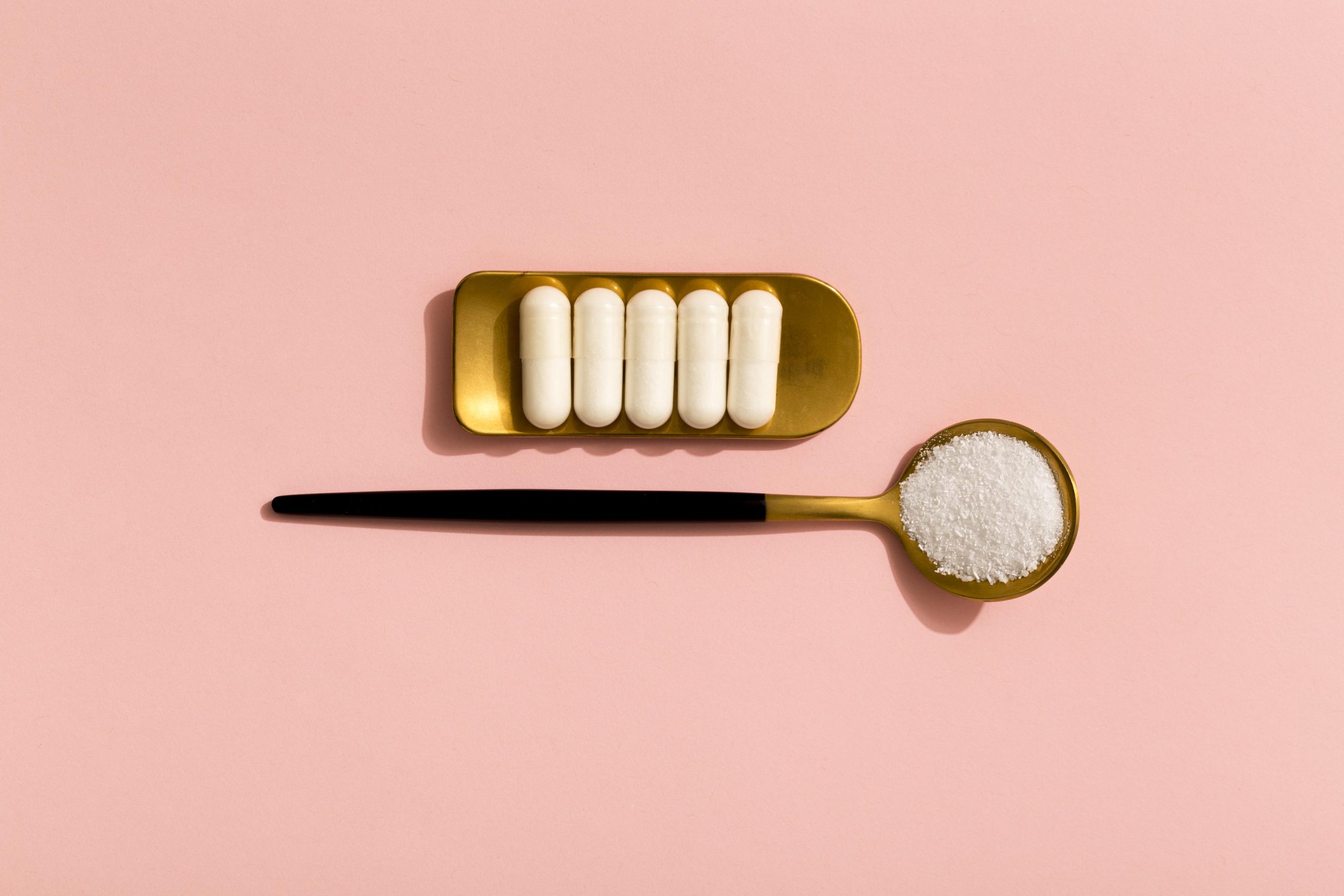
Why this is important
For the Muslim community
For the Muslim community, it is important to check if your medicine contains collagen and if it is Islamically permissible to take/use. To find out if a medicine contains collagen, see the section on ‘Checking medicine information’.
The permissibility of collagen is dependent upon which animal the collagen is sourced from. The Muslim community should follow their trusted scholars and certified halāl sources to ensure their medicines align with Islamic guidelines. To understand more about the permissibility of collagen see the section below on ‘Is all collagen halāl or harām?’.
For HCPs
For HCPs and anyone involved in delivering care and support, it is important to:
- Understand which ingredients and/or excipients in medicines may be a concern for practising Muslims and why – for further information, see our resources under ‘Ingredients and excipients in medicines‘
- Have open discussions with individuals about their personal values or beliefs that may relate to their care and support where possible – e.g. some individuals may wish to avoid certain ingredients/excipients in medicines due to religious beliefs, others may not be as practising or have the same beliefs, so it is important to ask
- Discuss ideas, concerns and expectations – e.g. during consultations, you may be asked to help individuals to understand whether certain ingredients/excipients are present in their medicine(s), its source, and whether it is likely to be considered permissible in Islam/suitable for a halāl diet
- To find out how to check if a medicine contains harām ingredients and/or excipients, see section on ‘Checking medicine information’.
- For further information on the conditions of when it is acceptable for a practising Muslim individual to take/use a medicine that contains harām ingredients and/or excipients, is derived from harām sources, or where there is cross-contamination with harām sources, see our resource on ‘What to do if a medicine contains harām ingredients and/or excipients’
- Understand that you may be asked to explore alternative formulations that meet the individual’s religious requirements (where available), alternative companies that make the medicine without a particular excipient/ingredient (where possible) or alternative treatment options for the condition (where clinically appropriate)
- HCPs may find the Specialist Pharmacy Service (SPS) resource on ‘Searching for presence or absence of an excipient in medicines‘ useful to help them find alternative halāl medicines that do not contain certain ingredients or excipients. Further information can be found on the SPS website
- There may be situations where you cannot prescribe/supply an alternative halāl medicine which you may need to explain to the individual – for further information, see sections on ‘Hardship begets facility’ and ‘Limitations on prescribing an alternative halāl medicine‘.
Checking medicine information
You can check if a medicine contains collagen using the relevant product patient information leaflet (PIL) or summary of product characteristics (SPC) which is available on the electronic medicines compendium (emc) website. You may also find our resource on ‘How to find out if a medicine contains harām ingredients and/or excipients’ useful. If you are still unsure if a medicine contains collagen, speak to your local pharmacist as they are the experts in medicines.
You may need to contact the manufacturer to find out other information such as source and halāl certification. Please note that information regarding cross-contamination or potential contact with harām sources (e.g. pork/alcohol) is not always readily available from manufacturers.
It is important to remember that even if you find out a medicine contains possible harām ingredients and/or excipients, is derived from harām sources, or that there is cross-contamination with harām sources, this does not always mean it is prohibited to take/use. For further information, see our resource on ‘What to do if a medicine contains harām ingredients and/or excipients’. It includes the conditions of when it is acceptable to take/use a medicine in these circumstances. It can also be used to support person-centred discussions between individuals and HCPs, and help make informed decisions around taking medicines that are both clinically appropriate and align with an individual’s Islamic values and beliefs.
Is all collagen halāl or harām?
The table below summarizes which sources of collagen are halāl or harām for each school of thought:2
| Source | Ḥanafī | Mālikī | Shāfiʿī | Ḥanbalī |
|---|---|---|---|---|
| Bovine (cow) collagen from dead Islamically slaughtered cows | ✅ Pure and permissible for consumption | ✅ Pure and permissible for consumption | ✅ Pure and permissible for consumption | ✅ Pure and permissible for consumption |
| Bovine (cow) collagen other than from bone in dead un-Islamically slaughtered cows | ✅ Pure and permissible for consumption | ❌Legally impure; harām to consume. All parts of the dead animal is impure; this includes collagen from bone. | ❌Legally impure; harām to consume. Bones are considered impure. | ❌Legally impure; harām to consume. Bones are considered impure. |
| Bovine (cow) collagen from other than bone and hide (i.e. tallow/cartilage/tendon) in dead un-Islamically slaughtered cows | ❌Legally impure; harām to consume | ❌Legally impure; harām to consume | ❌Legally impure; harām to consume | ❌Legally impure; harām to consume |
| Bovine (cow) tanned* or chemically treated hide/skin | ❌Pure-but cannot be consumed. Tanned cow hide/skin is considered pure and permissible to use but not for consumption. Ḥanafī scholars accept both chemical tanning (dabgh al-ḥaqīqī) and exposure to sun/dust (dabgh al-ḥukmī) for purification. purification. | ❌Legally impure-harām to consume | ❌Pure but cannot be consumed. Tanned cow hide/skin is considered pure and permissible for use but not for consumption. Shāfiʿī scholars accept only chemical tanning (dabgh al-ḥaqīqī) for purification | ❌Legally impure-harām to consume. |
| Porcine (pig) | ❌Harām | ❌Harām | ❌Harām | ❌Harām |
| Fish | ✅ Halāl | ✅ Halāl | ✅ Halāl | ✅ Halāl |
| Chicken slaughtered Islamically | ✅ Halāl | ✅ Halāl | ✅ Halāl | ✅ Halāl |
| Chicken slaughtered non-Islamically | ❌Legally impure; harām to consume except from bone | ❌Legally impure; harām to consume | ❌Legally impure; harām to consume | ❌Legally impure; harām to consume |
* Tanning process – the process that treats the collagen in animal skin and hides with a chemical agent to make leather4
In summary, collagen derived from Islamically slaughtered cows or chickens is considered pure and halāl according to all schools of thought. Collagen derived from non-Islamically slaughtered cows and chickens is harām and legally impure according to all schools of thought with the exception of the Ḥanafī school which considers bovine (cow) collagen halāl from bone even if slaughtered non-Islamically on the condition that there is no blood or moisture. Fish derived collagen is halāl and porcine (pig) derived collagen is harām according to all four schools of thought.
Halāl alternatives
If you are seeking halāl products, look fish derived, or halāl-certified bovine or halāl-certified chicken sources (where available and possible).
Summary
- Collagen is a protein found in animals and it is used as a drug delivery system in medicines.
- For the Muslim community, it is important to check if your medicine contains collagen and if it is Islamically permissible to take/use
- You can check if a medicine contains collagen using the PIL or SPC, alternatively you can speak to your local pharmacist
- If you are seeking information about halāl status or alternatives – do not stop, delay, change, or change the way you take/use your medicine(s) without discussing this first with the healthcare professional who prescribed/supplied it to you
- Always consult your healthcare professional if you have any questions and before making any decisions about your treatment.
- For HCPs and anyone involved in delivering care and support to the Muslim community, it is important to have open discussions with individuals about their personal values or beliefs that may relate to their care and support where possible
- Collagen derived from Islamically slaughtered cows or chickens is considered pure and halāl according to all schools of thought
- Collagen derived from non-Islamically slaughtered cows and chickens is legally impure and harām to consume according to all schools of thought with the exception of the Hanafī school which considers bovine (cow) collagen halāl from bone even if slaughtered non-Islamically on the condition that there is no blood or moisture.
- Fish derived collagen is halāl according to all schools of thought
- Porcine (pig) derived collagen is harām according to all four schools of thought.
- Follow the guidance of your school of thought (madhhab). If you have further queries about the permissibility of medicines, consult a qualified local Imam or trusted Islamic scholar (ideally someone who has relevant knowledge and expertise in the Fiqh of medicines)
- You can check if the following information is available from the relevant manufacturer(s) (manufacturers may have limited information):
- Source of collagen
- Halāl certification – to ensure halāl-compliant manufacturing
- If you are seeking halāl products, look fish derived, or collagen sourced from halāl-certified bovine or halāl-certified chicken (where available and possible).
References
- Harvard T.H. Chan School of Public Health. (2021, January 6). Collagen. The Nutrition Source. Retrieved August 18, 2025, from https://nutritionsource.hsph.harvard.edu/collagen/ ↩︎
- Rashid, R. (n.d.). Islamic rulings on the ḥalāl and ḥarām in medicine and food: Principles and applications. Al Balāgh Academy Publication Papers. ↩︎
- Lee, C. H., Singla, A., & Lee, Y. (2001). Biomedical applications of collagen. International Journal of Pharmaceutics, 221(1–2), 1–22. https://doi.org/10.1016/s0378-5173(01)00691-3 ↩︎
- Benedict Nnachi Alum (2024). Tannins and Leather: Chemistry, Tanning Processes, and Environmental Impacts. NEWPORT INTERNATIONAL JOURNAL OF SCIENTIFIC AND EXPERIMENTAL SCIENCES, 5(3):33-37. https://doi.org/10.59298/NIJSES/2024/10.5.333337 ↩︎
Image of tablets and spoon on pink background-designed by FreePix


